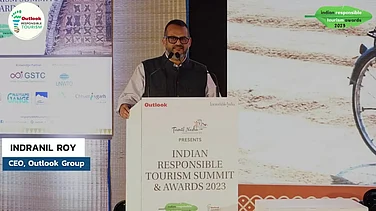It is the ultimate laid-back experience, but for me it started as a power trip. Literally, I discovered this unbelievable idyll just a 3-hr train ride away from Mumbai, when the equally incredible Nergis Irani launched a one-woman crusade against the thermal power plant being set up by the Bombay Suburban Electric Supply in Dahanu, the chikoo bowl of Maharashtra. I had passed Gholvad several times on train journeys to Ahmedabad—quaint, sleepy stations characterised by locals selling small baskets of just-picked fruit and bundles of lemongrass and peppermint leaves with which Parsis flavour their tea. I had no idea of the deep, dark groves that lay beyond the pedestrian platform.
Advertisement
Then Nargis Irani descended on my office like a Persian army. Her feisty Irani genes made up for whatever she lacked in the ‘warrior-queen’ department. As an environmentalist, she would have fought such desecration anywhere, but in the Gholvad she had an emotional stake, as these chikoo orchards had been planted by the Iranis, many of whom had cleared the grass-covered tracts with their bare hands when they had arrived here a hundred or so years ago. This tough, if rustic, race had been impoverished by discrimination in their native Iran and they too made the journey that their fellow Zoroastrians, the Parsis, had made nearly a millennium earlier. Some set up tea shops in Mumbai, but the more intrepid fanned into the interior, confident that land was land, even if in an alien country. With their own input of hard work, they were certain that it would sustain them, as it had their fore-fathers back home.
Advertisement
The house of the man who first brought chikoos to this area still stands near Dahanu Railway Station, the lush acres flourishing in the care of his grandsons. Those who followed old Mr Irani acquired and tamed their own sprawling acres. Grandchildren went away, lured by city jobs and the promise of golden opportunity abroad. Many returned. The land was as forgiving as it was yielding.
Things to see and do? The answer to this is ‘nothing’. The idea here is to chill. Wake up to the cock’s crow and open your eyes to a canopy of dark chikoo leaves. These orchards smell of the resins of the trees. Walk down the winding country road and smile at the curious women—rural cliches in their short ‘towel’ wraps above which rise their bare midriffs and bosoms. They sashay past with a self-assured swing, a chatter of berribboned sparrows as they go to water and weed, pluck and pack in the orchards.
Mud pots ‘grow’ out of every stunted toddy palm; they say slake the thirst of a day’s labour and fill the night with the drumbeat of abandon. Hens fret and strut about the reed and mud huts before meeting their fate in a festive cauldron.
Gholvad—rising above Bordi and merging unmarked into Dahanu and the surrounding villages—has no pin-downable focal point. It’s only orchards, and the homesteads of the people who cultivated them.
Getting There
Gholvad is on the road to Bordi, on the coastal highway after you turn left from Kasa Khurd towards Dahanu.
This article is from our archives.




















